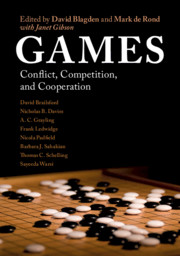Book contents
- Games
- The Darwin College Lectures
- Games
- Copyright page
- Dedication
- Contents
- Figures
- Notes on Contributors
- Acknowledgements
- Introduction Games: The Spectrum of Conflict, Competition, and Cooperation
- 1 Personal Principles in the Political Game
- 2 The Game of Crime and Punishment
- 3 Wittgenstein's Games
- 4 Games in Sports
- 5 Losing the ‘New Great Game’
- 6 Games for the Brain
- 7 Games Animals Play
- Afterword The Game Theory of Conflict
- Index
6 - Games for the Brain
Published online by Cambridge University Press: 26 October 2018
- Games
- The Darwin College Lectures
- Games
- Copyright page
- Dedication
- Contents
- Figures
- Notes on Contributors
- Acknowledgements
- Introduction Games: The Spectrum of Conflict, Competition, and Cooperation
- 1 Personal Principles in the Political Game
- 2 The Game of Crime and Punishment
- 3 Wittgenstein's Games
- 4 Games in Sports
- 5 Losing the ‘New Great Game’
- 6 Games for the Brain
- 7 Games Animals Play
- Afterword The Game Theory of Conflict
- Index
Summary
There is nothing more important than good brain health and wellbeing throughout our lives. Yet, while many people are concerned with their physical health and utilise wearable technology and mobile devices to monitor their exercise, steps, heart rate, and so forth, we are not yet using technology to enhance our brain health and wellbeing. In this chapter, we discuss how neuroscientists can work together with other experts in game development, IT, and computing to develop enjoyable games for enhancing cognition, such as memory. In addition, we discuss how we can use games to improve cognition, motivation, and the ability to function in daily life for people with neuropsychiatric disorders, such as schizophrenia. Everyone likes to play games, so why not play one that is fun and good for your brain?
- Type
- Chapter
- Information
- GamesConflict, Competition, and Cooperation, pp. 101 - 119Publisher: Cambridge University PressPrint publication year: 2018
- 1
- Cited by

